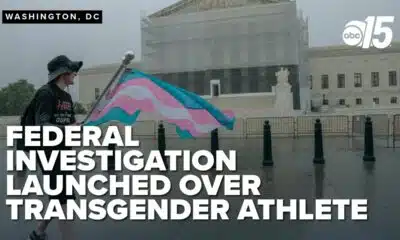News from the South - Texas News Feed
Texas Republicans eye ways to rein in high housing prices
“Why Texas Republicans are trying to rein in high home prices and rents” was first published by The Texas Tribune, a nonprofit, nonpartisan media organization that informs Texans — and engages with them — about public policy, politics, government and statewide issues.
Subscribe to The Y’all — a weekly dispatch about the people, places and policies defining Texas, produced by Texas Tribune journalists living in communities across the state.
DALLAS — For decades, Texas benefited from relatively low home prices and rents, a key component of the state’s ability to lure new residents and employers from more expensive parts of the country.
Now, Texas Republicans find themselves trying to rein in the state’s high housing costs — before it’s too late.
The state’s top Republicans have shown increasing alarm as high housing costs have put homeownership out-of-reach for an increasing number of Texas families, especially young ones. GOP leaders have pointed to figures from Texas Realtors that show the typical homebuyer is getting older. The median age of a Texas homebuyer was 48 in 2020. Last year, it was 58.
“Young people have been boxed out of the housing market,” Lt. Gov. Dan Patrick said at a news conference earlier this month.
There’s political urgency for Republicans to deal with housing affordability. They are increasingly aware that Texans view the state’s high housing costs as a considerable problem. A poll last year showed some 90% of Texans view housing affordability as a problem where they live — an agreement that transcends party lines and whether people live in a big city, suburb or rural town.
“Broadly, Texans want to see something done about housing,” said Felicity Maxwell, who heads the advocacy group Texans for Housing. “They’re very concerned about the costs and impact that it’s having on their budgets. They want to see solutions, and they want to see change.”
The stakes are high. Buying or renting a home is still cheaper in Texas than in chief rival states like California and New York. The state’s comparatively low housing costs have been a chief ingredient in attracting new residents and employers over the past decade. But there’s fear that Texas could wind up in the same position as those states, worsening the state’s competitive advantage, if lawmakers don’t act to contain home prices and rents. That means making it possible to build enough homes to meet demand from new and existing residents, said Scott Norman, Texas Association of Builders CEO.
“People who are coming here have to live somewhere,” Norman said.
Texas faces a substantial shortage of homes. The state needs about 320,000 more homes than it has, according to an estimate from the housing advocacy group Up For Growth, a finding embraced last year by the comptroller’s office in an oft-cited report drawing attention to the state’s housing affordability woes.
Under Patrick, Senate Republicans have advanced bills aimed at making it easier to build smaller homes on smaller lots, additional dwelling units in the backyards of single-family homes and residences along commercial corridors and in vacant office buildings. In the House, Speaker Dustin Burrows wants to make it easier for homebuilders to obtain permits and more difficult for neighboring property owners to stop new homes from being built among his top priorities.
Republicans’ proposals to tackle housing affordability aren’t a sure thing.
Many of Republicans’ housing proposals target local rules that determine what kinds of homes can be built and where — a prospect that unnerves some Democrats, who for the past decade have opposed GOP efforts to prevent cities from enacting certain policies and see many GOP proposals to deal with the housing crisis as an extension of that yearslong campaign. But many Senate Democrats, though not all, voted for housing bills that have cleared the Senate so far. Whether House Democrats, who helped kill similar legislation two years ago, will embrace or reject these ideas remains to be seen.
It’s also unclear how sympathetic lawmakers will be toward neighborhood groups who have voiced opposition to the bills and may not want new homes built in or even near their neighborhoods.
Some of the legislation they’re pitching would only go so far. Texas has more than 1,200 cities, but GOP proposals to reduce lot sizes and allow residences to be built in more places would only apply to its 18 largest cities.
And Texas has a deep shortage of homes affordable for the state’s poorest families, but state lawmakers appear unlikely to put more funds toward building those kinds of homes — though the reforms that have caught on will still likely make those homes easier to build.
At the same time Republicans are trying to make it easier to build homes, they’re pursuing legislation that housing groups and tenants’ advocates say would make it easier for landlords to evict renters.
Even if Republicans manage to enact their housing agenda at the state level, that affordability push will undoubtedly be undercut by President Donald Trump’s immigration and trade agenda.
Immigrants make up a considerable chunk of the state’s construction workforce, which would be disrupted should Trump proceed with mass deportations — resulting in fewer homes built and higher costs as a result.
Tariffs on materials used to build homes threaten to drive up construction costs, resulting in higher prices for would-be homebuyers and renters. Trump enacted a 25% tariff on imported steel, used in the building of apartments. He’s also promised to enact higher levies on Canadian lumber used to build homes. Texas homebuilders tend to get their lumber from domestic sources, Norman said. But tariffs on Canadian lumber could increase competition for domestic lumber supply — driving up material prices and home prices as a result.
“It’ll be a shame if we get all these passed and whatever savings all these incremental changes make get eaten up by tariffs, which they could,” Norman said.
Texas Republicans have adopted a playbook similar to what other states like Montana, Florida, California and Oregon have enacted in recent years to try to rein in their housing costs, said Alex Armlovich, senior housing policy analyst at the Niskanen Center, a libertarian think tank. Enacting that playbook in Texas could help the state prevent housing costs from rising as high in the long run as they have in California, Armlovich said.
“Texas is starting early enough that you can avoid a lot of pain if you get moving now,” Armlovich said.
That agenda is popular with Texas voters, a recent poll conducted by YouGov and Texans for Housing found. A majority of registered voters support allowing smaller homes on smaller lots, poll results show. More than two-thirds of voters think it’s a good idea to make it easier to build accessory dwelling units, allow vacant office and commercial buildings to become homes and allow more homes in business and shopping districts.
For Republicans, such moves have the ideological appeal of reducing government regulations, unshackling the free market and boosting property rights.
Somewhat more urgent amid the state’s housing shortage is the idea of allowing homes to be built in more places — particularly in places where people already live, work and play.
“The bottom line is there’s no new land coming online,” state Sen. Bryan Hughes, a Mineola Republican behind some of the Senate’s efforts, said during floor debate on one of the bills. “It’s supply and demand. If there’s land ripe for development, for homes, for families, no government should stand in the way.”
There’s also frustration among Republicans, shared by at least some Democrats, that many cities, they perceive, haven’t done enough to contain housing costs, chiefly by allowing enough homes to be built, amid the state’s boom — and in some cases are actively trying to stop new homes from going up.
Senate lawmakers last month passed a bill to allow smaller homes on smaller lots by reducing the amount of land cities require single-family homes to sit on — at least in new subdivisions, not in existing neighborhoods. Senate Bill 15, a top Patrick priority, would bar cities from requiring homes in those subdivisions to sit on more than 1,400 square feet. In the state’s biggest cities, the most common lot-size requirements sit between 5,000 and 7,500 square feet, according to a Texas Tribune analysis.
Patrick has voiced frustration with such rules — which housing experts contend either force homebuyers to buy more land than they want, leaving them with higher housing costs, or help price them out altogether.
“Not everyone who starts out needs a home on a big lot with a lot of square footage,” Patrick said at the press conference. “And in a lot of communities, they’re stuck in that position.”
That impatience has surfaced as leaders of some cities testified in opposition to proposals that would take some land-use decisions out of their hands.
Ann Martin, the mayor pro tem of the North Texas suburb Flower Mound, testified against a bill in March that would allow houses of worship to build homes on land they own. The proposal would bypass local ordinances that say what religious organizations can do with their land and city councils that would have the final say in whether to rezone those properties to allow housing.
Martin said town leaders worry the bill would extend an unfair benefit to religious groups and that developers could unduly masquerade as religious organizations to build homes they wouldn’t otherwise be able to build.
State Rep. Gary Gates, a Richmond Republican who authored the bill, noted that the typical home in Flower Mound goes for about $600,000 — among the most expensive cities in the state, according to Zillow. (Rents in Flower Mound, too, are among the highest in Texas.)
“You have retail stores, you have fast food restaurants,” Gates said to Martin. “There’s employees there that earn $8, $10, $12 an hour…do you really want to force everyone that works and provides services for your residents to have to live outside that city?”
Not everyone who works those jobs commutes to Flower Mound from surrounding cities, Martin said; teenagers who live at home hold those jobs, too. The Flower Mound City Council recently approved a plan to allow 6,000 apartments to be built, she noted.
“It’s not that we don’t want apartments,” Martin said. “We just plan for them in zones where it makes sense.”
So far, Democrats have been hard to pin down.
Democrats in the Legislature have long been in a defensive posture, trying to shield the state’s urban areas from efforts by the GOP-dominated Legislature over the last decade to chip away at local governments’ ability to enact progressive policies.
That posture, in part, drove House Democrats to kill similar housing legislation two years ago. So far, the House hasn’t voted on housing legislation.
Some Democrats this year have shown discomfort with the state weighing in on what kinds of homes cities allow and where — a power the state grants to cities. They’ve also expressed concerns about measures in some of the bills that would allow residents to sue cities that don’t comply with state law should they pass. State Sen. Sarah Eckhardt, an Austin Democrat, said the bill to allow residences in commercial, retail and office areas constitutes “putting the big boot of the state on the necks of our local governments.”
But more than 60% of Texas voters surveyed by YouGov and Texans for Housing said preserving local control isn’t as important as allowing property owners to build more kinds of homes “to meet the needs of their community.”
Some Texas cities have made moves in recent years to remove barriers to housing construction. City Council members in Austin, which saw huge spikes in home prices and rents during the COVID-19 pandemic, enacted a series of reforms in recent years intended to boost supply and relieve housing pressure — like reducing lot-size rules, allowing up to three homes to be built in most places where previously only one was allowed and eliminating requirements that new homes be built with a certain amount of parking. At the same time, the Austin region experienced a massive apartment building boom — and as a result, rents have dipped for nearly two years.
But those moves were only possible owing to a major political realignment in Austin, housing advocates have said — accelerated by sky-high rents and home prices exceeding $500,000. Proponents of statewide zoning reform fear officials in other cities, fearful of potential backlash from existing homeowners, won’t take substantive action on housing unless costs get as bad as they did in Austin — though a majority of renters in the state’s major urban areas already spend too much of their paycheck on housing and home prices have grown beyond the reach of many families.
“I try to defer where I can to local control,” said state Sen. Nathan Johnson, a Dallas Democrat, who voted for the bills to reduce lot sizes and allow ADUs. “But there are some things I think that politically are impossible at the local level.”
Disclosure: Texas Association of Builders has been a financial supporter of The Texas Tribune, a nonprofit, nonpartisan news organization that is funded in part by donations from members, foundations and corporate sponsors. Financial supporters play no role in the Tribune’s journalism. Find a complete list of them here.
Tickets are on sale now for the 15th annual Texas Tribune Festival, Texas’ breakout ideas and politics event happening Nov. 13–15 in downtown Austin. Get tickets before May 1 and save big! TribFest 2025 is presented by JPMorganChase.
This article originally appeared in The Texas Tribune at https://www.texastribune.org/2025/04/22/exas-republicans-legislature-housing-affordability/.
The Texas Tribune is a member-supported, nonpartisan newsroom informing and engaging Texans on state politics and policy. Learn more at texastribune.org.
The post Texas Republicans eye ways to rein in high housing prices appeared first on feeds.texastribune.org
Note: The following A.I. based commentary is not part of the original article, reproduced above, but is offered in the hopes that it will promote greater media literacy and critical thinking, by making any potential bias more visible to the reader –Staff Editor.
Political Bias Assessment: Centrist
The content presents a balanced and fact-based exploration of Texas’ housing crisis, touching on various proposals from both Republican and Democratic perspectives. It highlights efforts from Texas Republicans to address the rising housing costs while showcasing differing opinions within the party and some discomfort from Democrats regarding state intervention in local zoning laws. The article provides direct quotes from both Republicans and Democrats, offering equal weight to their concerns and positions on the issue. Additionally, it references public polling data and housing expert opinions that reflect a variety of perspectives. This approach avoids clear ideological leanings, making the content centrist.
News from the South - Texas News Feed
What’s happening with the money Travis County approved for affordable child care?
SUMMARY: Travis County approved a 2.5-cent property tax increase in November to fund affordable child care, generating about \$75 million in its first year. This funding aims to create 1,900 child care slots for low-income babies and toddlers and nearly 3,900 after-school and summer slots for elementary students, while incentivizing businesses to expand child care options. Early services are launching this summer and fall, including funding waitlisted families, supporting working parents, and expanding existing programs. Public input has influenced these efforts, especially for children under three, prompting the county to accelerate funding initiatives and partnerships with Austin. The next update is due July 15.
The post What's happening with the money Travis County approved for affordable child care? appeared first on www.kxan.com
News from the South - Texas News Feed
2025 Texas Longhorns football preview: The running back room looks loaded
SUMMARY: The Texas Longhorns running back room is poised for a stronger 2025 season after injuries sidelined key players like CJ Baxter and Christian Clark in 2024. Baxter, returning healthy, is expected to lead alongside Quintrevion Wisner, who rushed for over 1,000 yards last year, and bruising freshman Jerrick Gibson. Depth is bolstered by promising recruits James Simon and Rickey Stewart Jr. The offense may gain new versatility with quarterback Arch Manning’s mobility. However, Texas must improve ball security after fumbling 26 times in 2024. Additionally, new running backs coach Chad Scott replaces Tashard Choice, bringing experience from West Virginia.
The post 2025 Texas Longhorns football preview: The running back room looks loaded appeared first on www.kxan.com
News from the South - Texas News Feed
Breaking down the verdict for Sean “Diddy” Combs
SUMMARY: Hip hop mogul Sean “Diddy” Combs was found guilty of two out of five prostitution-related charges but acquitted of the more serious sex trafficking and racketeering charges after an eight-week trial in Manhattan. The jury deliberated for 13 hours over three days, delivering a mixed verdict. Combs remains jailed awaiting sentencing, with each charge carrying up to ten years. His defense denies involvement and plans to appeal. Despite some relief, the judge denied bail citing past violence. A remote hearing is scheduled for October 3 to possibly expedite sentencing, with credit given for time already served.
Hip-hop mogul Sean “Diddy” Combs was found guilty of two out of five counts of prostitution related charges. He was acquitted of the most serious charges of sex trafficking and racketeering.
Subscribe to FOX 4: https://www.youtube.com/fox4news?sub_confirmation=1
Dallas news, weather, sports and traffic from KDFW FOX 4, serving Dallas-Fort Worth, North Texas and the state of Texas.
Download the FOX LOCAL app: fox4news.com/foxlocal
Watch FOX 4 Live: https://www.fox4news.com/live
Download the FOX 4 News App: https://www.fox4news.com/apps
Download the FOX 4 WAPP: https://www.fox4news.com/apps
Follow FOX 4 on Facebook: https://www.facebook.com/Fox4DFW/
Follow FOX 4 on Twitter: https://twitter.com/FOX4
Follow FOX 4 on Instagram: https://www.instagram.com/fox4news/
Subscribe to the FOX 4 newsletter: https://www.fox4news.com/newsletters
-
News from the South - Georgia News Feed6 days ago
Are you addicted to ‘fridge cigarettes’? Here’s what the Gen Z term means
-
News from the South - Oklahoma News Feed7 days ago
RFK Jr. Brings MAHA to Oklahoma
-
Local News7 days ago
St. Martin trio becomes the first females in Mississippi to sign Flag Football Scholarships
-
News from the South - South Carolina News Feed6 days ago
Federal investigation launched into Minnesota after transgender athlete leads team to championship
-
The Center Square5 days ago
U.S. Senate prepares for passage of One Big Beautiful Bill Act | National
-
News from the South - Tennessee News Feed5 days ago
Democratic resolution to block military action in Iran fails to advance in US Senate
-
News from the South - Virginia News Feed7 days ago
‘Hallowed ground, desecrated’: ICE sweeps at Chesterfield court draw fierce backlash
-
News from the South - Florida News Feed7 days ago
US Supreme Court allows SC to remove Planned Parenthood from list of Medicaid providers












































